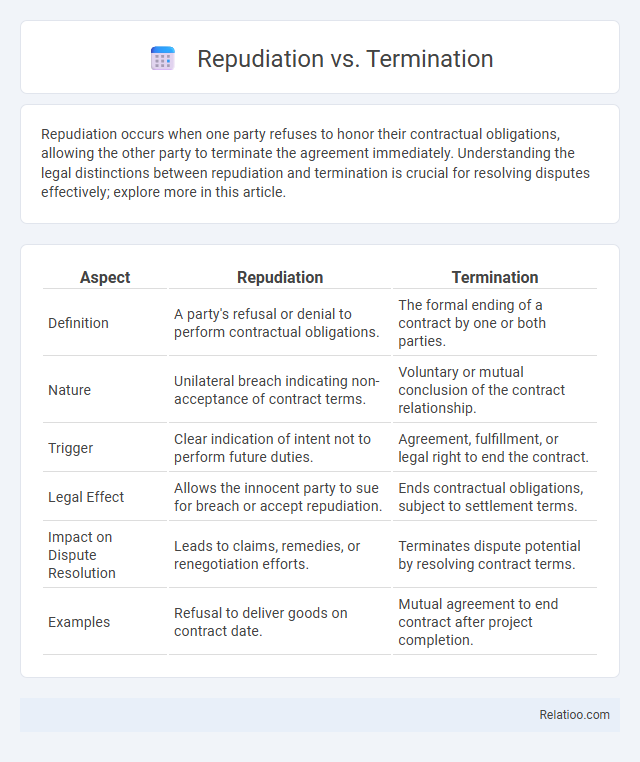Repudiation occurs when one party refuses to honor their contractual obligations, allowing the other party to terminate the agreement immediately. Understanding the legal distinctions between repudiation and termination is crucial for resolving disputes effectively; explore more in this article.
Table of Comparison
| Aspect | Repudiation | Termination |
|---|---|---|
| Definition | A party's refusal or denial to perform contractual obligations. | The formal ending of a contract by one or both parties. |
| Nature | Unilateral breach indicating non-acceptance of contract terms. | Voluntary or mutual conclusion of the contract relationship. |
| Trigger | Clear indication of intent not to perform future duties. | Agreement, fulfillment, or legal right to end the contract. |
| Legal Effect | Allows the innocent party to sue for breach or accept repudiation. | Ends contractual obligations, subject to settlement terms. |
| Impact on Dispute Resolution | Leads to claims, remedies, or renegotiation efforts. | Terminates dispute potential by resolving contract terms. |
| Examples | Refusal to deliver goods on contract date. | Mutual agreement to end contract after project completion. |
Understanding Repudiation in Contract Law
Repudiation in contract law occurs when one party clearly indicates an unwillingness or inability to perform their contractual obligations, allowing the other party to treat the contract as breached. Termination ends the contract by mutual consent or based on specific terms, while repudiation involves a fundamental breach that justifies ending the agreement. Understanding repudiation helps you identify when you can lawfully cease performance and seek remedies due to the other party's rejection of the contract.
Defining Termination of a Contract
Termination of a contract involves the lawful ending of obligations between parties before the contract's full performance, either by mutual consent or due to breach. Repudiation occurs when one party clearly indicates an unwillingness or inability to perform, allowing the other party to terminate or seek damages. Understanding how termination differs from repudiation helps you determine your rights and remedies under contract law.
Key Differences Between Repudiation and Termination
Repudiation occurs when one party explicitly refuses to fulfill contractual obligations, signaling a breach that allows the other party to treat the contract as ending immediately. Termination, on the other hand, is the formal ending of the contract either by mutual agreement, fulfillment, or lawful cancellation due to breach or other conditions. Your understanding of these concepts helps in identifying when to act on repudiation as grounds for legal termination or to seek remedies for a breached contract.
Legal Implications of Repudiation
Repudiation occurs when one party clearly indicates they will not perform their contractual obligations, which allows the non-breaching party to treat the contract as terminated and seek damages. Termination officially ends the contract and may result from repudiation, mutual agreement, or breach, affecting your right to enforce contract terms. Understanding repudiation's legal implications is crucial, as it triggers immediate remedies and alters the contractual relationship, protecting your interests in potential disputes.
Grounds for Contract Termination
Grounds for contract termination include lawful causes such as breach, mutual consent, or impossibility of performance, while repudiation specifically refers to one party's refusal to fulfill contractual obligations, allowing the other party to terminate the agreement. Repudiation differs from termination in that it is an anticipatory act or indication of intent not to perform, giving your contract partner the right to terminate based on that anticipatory breach. Understanding these distinctions helps you identify valid grounds to end contracts effectively and protect your legal interests.
Consequences of Repudiation vs Termination
Repudiation occurs when one party indicates an unwillingness or inability to perform contractual obligations, allowing the innocent party to treat the contract as terminated immediately and seek damages. Termination, in contrast, is a formal act either mutually agreed upon or triggered by breaches or specific contract clauses, ending obligations without necessarily implying fault. The consequences of repudiation typically include the right to sue for breach of contract and recover losses, whereas termination may limit remedies to contractual provisions without automatic entitlement to damages.
Remedies Available After Repudiation
When a party commits repudiation, the non-breaching party has several remedies available, including treating the contract as terminated and seeking damages for breach. Termination of a contract may be a direct consequence of repudiation but can also occur independently due to other breaches or mutual agreement. Your ability to recover damages or enforce specific performance hinges on the nature of the repudiation and the contract terms.
Steps to Lawfully Terminate a Contract
Lawful termination of a contract requires a clear understanding of the distinctions between repudiation, termination, and breach. To lawfully terminate, a party must first identify a material breach or repudiation by the other party, providing evidence of non-performance or refusal to fulfill contractual obligations. Next, the aggrieved party must formally notify the breaching party of the breach and intention to terminate, followed by documenting the termination in writing to ensure legal enforceability and prevent future disputes.
Real-World Examples: Repudiation vs Termination
Repudiation occurs when one party clearly indicates an unwillingness or inability to perform contractual obligations, such as a supplier refusing to deliver goods before the due date. Termination, on the other hand, is the formal ending of a contract by one or both parties, often due to breaches like non-payment or failure to meet deadlines, exemplified by a client canceling a service agreement after repeated missed deliveries. Understanding your rights during repudiation versus termination can help you effectively manage contract disputes and seek remedies like damages or contract rescission.
Best Practices for Managing Contract Disputes
Managing contract disputes effectively involves understanding the distinctions between repudiation, termination, and breach of contract. Your best practice should include promptly identifying repudiation, which occurs when one party explicitly refuses or is unable to perform contractual obligations, allowing you to consider termination or seek remedies. Clear communication, thorough documentation, and seeking legal advice ensure that disputes are resolved while minimizing risks and preserving business relationships.

Infographic: Repudiation vs Termination
 relatioo.com
relatioo.com